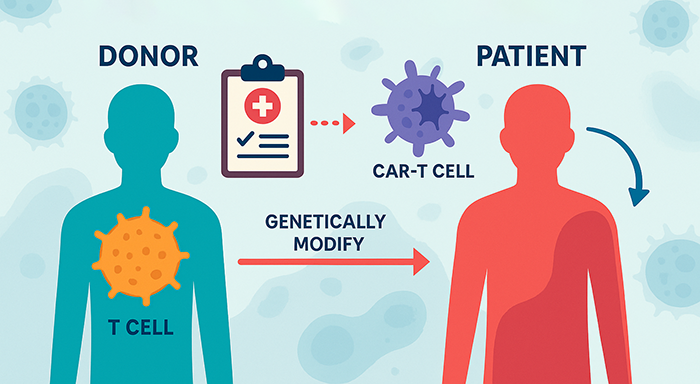CAR-T cell therapy has revolutionized leukemia treatment, particularly for relapsed or refractory cases. This approach genetically modifies a patient's T cells to target cancer-specific antigens, achieving durable remissions in some cases.
Donor-derived CAR-T therapy, which uses T cells from a healthy donor rather than the patient, is considered in specific scenarios:

When to Consider Donor-Derived CAR-T:
- Relapse after allogeneic stem cell transplant (HSCT):
Donor-derived CAR-T is particularly effective for patients whose leukemia recurs post-HSCT. Since their immune system is already donor-derived, these CAR-T cells face less rejection risk and can persist longer. A phase I trial demonstrated a 70% complete remission rate in B-cell acute lymphoblastic leukemia (B-ALL) patients relapsing after HSCT. - Compromised autologous T cells:
Heavily pretreated patients often have insufficient or dysfunctional T cells for autologous therapy. Donor-derived CAR-T bypasses this issue using healthy donor cells, which proliferate more effectively. - T-cell malignancies (e.g., T-ALL):
For T-cell acute lymphoblastic leukemia (T-ALL), donor-derived CD7-targeted CAR-T has shown durable responses. A 2-year follow-up study reported sustained remission in a subset of patients, though relapse remained the primary cause of treatment failure.
Key Advantages:
- Reduced rejection risk: Donor-derived cells align with the patient's post-HSCT immune profile.
- Long-term persistence: CAR-T cells can remain active for months to years, providing ongoing surveillance.
- Rapid availability: Donor cells can be banked in advance, avoiding production delays during relapse.
Safety Considerations:
- Early adverse events include cytokine release syndrome and mild graft-versus-host disease.
- Late risks include severe infections and rare GVHD exacerbations.
Efficacy Outcomes:
- B-ALL: 79–89% complete remission rates with donor-derived CAR-T.
- T-ALL: 60% of patients maintained remission at 2 years in CD7 CAR-T trials.
Donor-derived CAR-T is not first-line therapy but becomes critical when autologous options fail or are impractical. Ongoing research aims to expand its use to other blood cancers, including AML, through universal CAR-T designs.
Publication date: May 1, 2025.
Sources
lls.org
pubmed.ncbi.nlm.nih.gov
thelancet.com
cancer.gov
cancer.gov
dana-farber.org
nature.com
ascopubs.org










